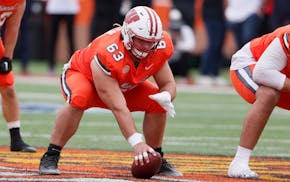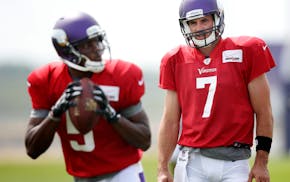Winners a month ago, the reigning Super Bowl champion Baltimore Ravens were universally lumped in with this week's "losers."
Funny how that works for teams that draft well and win championships. Funny how those of us who do the lumping this time of year never learn that the first week of free agency is rarely, if ever, a good time for adulation and granting a spot among the media's "winners."
A colleague might have put it best. "This," he said, "is Browns season!" Presumably, the Ravens, Steelers and their combined eight Super Bowl rings are OK with sharing some positive AFC North headlines in the month of March.
If the Pro Football Hall of Fame had a wing set aside for the champions of March, Redskins owner Dan Snyder would be Curly Lambeau. Albert Haynesworth, the worst of Snyder's many expensive swings and misses through many a spring, would be Joe Greene.
This year, Mike Wallace, the top prize of 2013, would be guaranteed of going to Miami and making Ryan Tannehill the next Ben Roethlisberger. Then he'd run and catch deep balls like Paul Warfield. After all, no team ever has gone wrong in March with an overpay-and-pray philosophy, right?
The league's bottom feeders need successful teams with sound, draft-based foundations to nibble on in March. The Ravens, of course, are no strangers to being eaten alive.
This year, chunks of flesh are being torn away because Baltimore's only priority resulted in quarterback Joe Flacco getting $120.6 million over six years. That's why two top defenders, Paul Kruger and Dannell Ellerbe, ended up in Cleveland and Miami, respectively, for a combined $75.6 million.
Throw in cornerback Cary Williams signing with Philadelphia, the Anquan Boldin trade to San Francisco, Ray Lewis' retirement and Ed Reed's expected departure via free agency and, well, the Ravens are kaput. Right?
Not so fast. The Ravens under General Manager Ozzie Newsome are a classic example of a franchise that's built on something more solid than a transaction that leads SportsCenter during the first week of March. They don't feed on 27-year-old household names from other teams. They pick 22-year-olds and make them household names.
In 1997, the Ravens signed Priest Holmes as an undrafted rookie. In 2002, they did the same thing with Bart Scott. Heck, Ellerbe was undrafted himself.
In 2000, linebacker Adalius Thomas was a no-name sixth-round pick. In 2007, he was one of the hottest tickets in free agency.
The Ravens also take advantage of compensatory picks as well as, if not better than, any other team in the league. Of course, no one gets excited about compensatory picks. There's no "Compensatory Picks Countdown!" or "Compensatory Picks Tracker!"
But compensatory picks, which are positioned from Rounds 3-7, are a big deal behind the scenes. Teams can get up to four of them per year based on a complex formula that determines the value of players lost and acquired via free agency.
This year, the Ravens, naturally, have four compensatory picks, raising their total to an NFL-high 37 since 1996. This year, they get a fourth-rounder for losing Ben Grubbs, a fifth-rounder for Jarrett Johnson, a sixth-rounder for Cory Redding and a seventh-rounder for Tom Zbikowski. None of those four players was needed to win Super Bowl XLVII.
Compensatory picks can't be traded, but they do provide the power to trade other picks. The extra picks also prevent teams from having to reach to fill a need.
They also unearth some gems. In 2003, the Ravens used a fourth-rounder on fullback Ovie Mughelli, who became a Pro Bowler. In 2007, they used another fourth-rounder on another fullback, Le'Ron McClain, who became yet another Pro Bowler.
Quarterback Derek Anderson, who made the Pro Bowl in Cleveland, was a sixth-round compensatory pick of the Ravens in 2005. Guard Edwin Mulitalo, an eight-year starter for the Ravens, was a fourth-round compensatory pick in 1999.
"When somebody gives you an extra draft pick, and you can turn it into another young body, that's an advantage you can't ignore," Newsome said years ago. "Those compensatory choices, believe me, are more important than people realize."
Mike Vrabel and Hines Ward joined the Steelers as compensatory picks. Matt Hasselbeck, Scott Wells, Pierre Garcon, Antoine Bethea and Marques Colston all were compensatory picks.
Of course, you still need someone qualified enough to make those late-round picks. A perfect example came in 2000.
With the 183rd pick of that year's draft, the Browns selected quarterback Spergon Wynn with a regular sixth-round pick. Sixteen picks later, the Patriots used one of their compensatory picks on another quarterback. His name was Tom Brady.
Mark Craig • mcraig@startribune.com

Flores channels 'inner Zimmer,' makes pitch for another cornerback

O'Connell has spent life around QBs. Can that help Vikings draft one?

Tackles are solid, but Vikings' offensive line still has big needs


